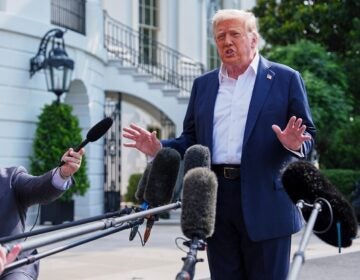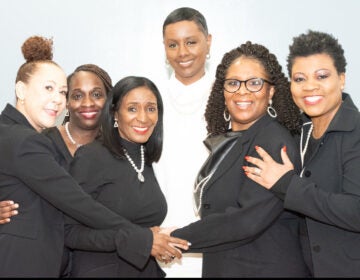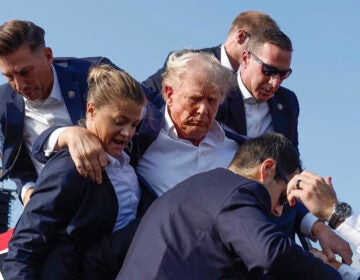Ten years on, reassessing some words of 9/11
By now, you might well be weary of 9/11 reminiscence. But it’s a hard topic to avoid on this day.
My job on that day was nothing heroic. It was to write a newspaper editorial, to gather up the strands of emotion and meaning flying about and try to put them in some useful order.
On this anniversary, I took a look back at the piece I wrote on that afternoon of confusion and fear.
In it, I tried to look past the smoking rubble to the moral issues that would soon emerge.
Here’s what it said in part:
“America’s middle-aged generation has often pondered with a mix of relief and shame how it has never been tested the way its parents were.
“Well, now comes its test. Not a clarion call to action, but a test of judgment: What is the noblest path out of the rubble?
“The emotions roiling inside us today carry the seeds of further risk. We feel rage. We feel fear. We are bewildered.
“We are hated.
“The question is: Will we hate back?
“In grief and confusion, we will be tempted to lash out at convenient targets. We must resist the urge.
“We must keep before our eyes the bond that unites us as citizens of America rather than racing to blame fellow Americans because of their ethnicity.
“Soon, law enforcement will ask for greater powers to forestall other crimes. Such changes we will have to ponder. But let us not allow our liberty to be the final victim claimed by terror.
“Finally, let us summon one more time the better angels of our nature. Let us comfort the injured and grieving in every way mercy and ingenuity can devise. Let us give our money, our sweat, our blood, whatever the moment requires. Let us forget regional rivalry and work as one nation to rebuild the great city at the mouth of the Hudson. Let us undo the vast damage from these crimes with our eyes fixed not on individual gain but on the common good.
“Let us show the world how a free, brave and united nation behaves in the face of calamity and of evil.”
Ten years on, how did we do in meeting these challenges?
I’m afraid my judgment on that question is not a happy one. What is yours?
In case anyone wants to read the entire editorial, here it is:
From the Philadelphia Inquirer, Sept. 12, 2001
It was a day without parallel, a day the unthinkable shattered America.
It was a day of horrors that beggared understanding, of grief that dwarfed language. A day of heroism and evil, of cascading rage, frustration and bewilderment.
A day of fear.
Yesterday, acts of war were waged against a free people by an undeclared enemy. In a few swift blows, more were killed than have died in arms in many a war.
It was a day that shredded a privileged peoples’ routines; that exposed how fragile are the cordons of security that protect us and the sinews of technology that connect us. A day when, under sunny skies, two vital American cities were paralyzed by dread. A day when stomachs churned as hands grasped phones and feet raced to cars to make sure children and lovers sisters and brothers, were safe.
A day whose memory will ripple through every moment of the rest of our lives.
A privileged generation’s test
On the first dawn after this day without parallel, a nation proud of its capacity to conquer crisis faces a unprecedented challenge. America’s middle-aged generation has often pondered, with a mix of relief and shame, how it has never been tested the way its parents were.
Well, now comes its test. Not a clarion call to action, but a test of judgment: What is the noblest path out of the rubble?
First must come the sad reckoning. How many died and how awfully?
These acts of war caused untold damage and disruption – dislocations the world economy may take a long time to unravel. But the ledger of yesterday’s woes will forever list, first and foremost, the innocents who lost their lives.
Let us pray for the lost
There were the many aboard the hijacked planes, people taking to the skies on workaday tasks, intent on buying, selling, teaching, learning, playing a round of golf or visiting a newborn niece. They all died after minutes of terror that history will never forget.
Let us pray for them, and those who love them.
There were the thousands inside the two towers that stood as shimmering exclamation points to the globe’s best-known skyline. At the top of a new day, people inside the towers were checking emails, scanning tickers, chatting over coffee, checking their daybooks. Within an hour, the buildings had toppled like a toddler’s stack of blocks, felled by the flick of a malignant finger. The fiery chaos claimed so many so quickly, and scarred the survivors forever.
Let us pray for them and those who love them.
There were the workers at the Pentagon who, whether uniformed or civilian, had pledged their labors to protect the nations’s security. Yet, somehow in ways we will be a long time ruing, hate managed to strike even at the symbol of America’s might. And inside the Pentagon, many Americans died.
Let us pray for them, and those who love them.
Let us pray also for the heroes who gave or risked their lives to save others amid the dread of chaos. They have forever our admiration and thanks.
And let us pray for ourselves, for we will have need of spiritual strength to survive the catastrophe with our ideals intact.
Of revenge and risk
The emotions roiling inside us today carry the seeds of further risk.
We feel rage. We feel fear. We are bewildered.
We can’t avoid acting on feelings. Yet we must calibrate our response against the ideals of liberty and tolerance that have made this nation work so well for so long.
Today, the thirst for vengeance burns like white fire, more than on any dawn since Pearl Harbor. But in December 1941, at least, the enemy was known, the options of war evident.
Today all we know is that America is hated by an enemy who is shadowy, resourceful and fond of grand, bloody symbolism. We are hated, for our casual freedom, our considered tolerance, our energetic wealth and military might.
The question is: Will we hate back? There is no question that America must respond to this act of war. But it is up to the President and his team to measure and execute the appropriate response.
The hand that sowed such anguish may long remain unknown. So in grief and confusion, we will be tempted to lash out at convenient targets. We must resist the urge.
It is uncertain who planned or did this, but most suspect the deeds are linked through twisted ideology to the bubbling anguish in the Middle East.
So we must keep our heads, learning from the errors of prejudice and internment, committed in previous national crises. We must keep before our eyes the bond that unites us as citizens of America rather than racing to blame fellow Americans because of their ethnicity.
Balance liberty and safety
Another awful truth will dawn on us as we sift the rubble: It is easier to do this to America because it is a free country.
Clearly, our borders, our airports were not as secure as we had believed. Clearly, we will have to endure greater delay and intrusion, when we seek to travel by air. Clearly, law enforcement will ask for greater tools and powers to forestall other crimes.
Such changes we will have to ponder. But let us not allow our liberty to be the final victim claimed by terror.
America has always been committed to the difficult balance between security and freedom. Even in the wake of this horror, let us not abandon that worthwhile struggle.
Let us rise
Finally, let us summon one more time the better angels of our nature.
Let us mourn united as a people. Let us comfort the injured and grieving in every way that mercy and ingenuity can devise.
Let us give our money, our sweat, our blood, whatever the moment requires. Let us forget regional rivalry and work as one nation to rebuild the great city at the mouth of the Hudson.
Let us undo the vast economic and civic damage from these crimes with our eyes fixed not on individual gain but on the common good.
Let us show the world how a free, brave and united nations behaves in the face of calamity and of evil.
WHYY is your source for fact-based, in-depth journalism and information. As a nonprofit organization, we rely on financial support from readers like you. Please give today.




